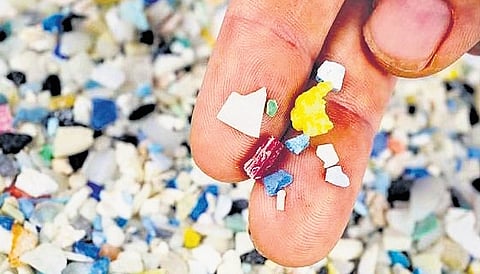

THIRUVANANTHAPURAM: While plastic pollution along Kerala’s coast continues to spark concerns, a new study by cancer researchers from the state’s medical colleges has set alarm bells ringing about a possible link between microplastics and gallbladder cancer (GBC).
The research, published in the ‘Indian Journal of Medical and Paediatric Oncology’, draws a connection between GBC and microplastics found in the Ganges, one of the most polluted rivers in India. The study suggests that the potential carcinogenic effects of microplastics in such water bodies could help explain the rising incidence of GBC, including in regions like Kerala.
While earlier studies have explored the link between environmental pollutants and GBC, the latest research focuses specifically on the role of microplastics – tiny plastic fragments less than 5mm in size – in triggering the disease.
Though the full impact of microplastics on human health is still being studied, researchers point to mounting evidence that the particles can cause harmful effects, including immune system activation, inflammation, oxidative stress (damage caused by unstable molecules), disruption of gut microbiota and interference with fat metabolism, all of which may contribute to cancer development.
The study also notes that elevated rates of GBC are not confined to the Gangetic belt alone, but are also seen in other regions with high levels of riverine microplastic pollution. With an estimated 21,000 new GBC cases reported in India per year, the findings are crucial for regions like Kerala, where plastic contamination is on the rise.
“Gallbladder cancer rates in Kerala remain relatively low compared to other parts of the country. However, oncologists have observed a steady increase in cases,” said Dr Aju Mathew of the department of oncology, Malankara Orthodox Syrian Church Medical College, Kolenchery, one of the authors of the study.
“If pollution in our water bodies continues to grow, it could trigger a major health crisis, with cancer being one of the long-term consequences,” he said, while emphasising the importance of pollution control, noting that the findings should serve as a warning. “This study suggests polluted water bodies could increase the risk of gallbladder cancer. As a society, we must act to mitigate the health hazards posed by environmental pollution,” he said.
The study was co-authored by Dr Jeffrey Mathew Boby from the Department of medicine, Kozhikode Government Medical College.
India generates around 15 million tonnes of plastic waste each year, of which only about 25% is recycled, according to a UNDP report (2018-24). The rest often ends up in the environment, where it breaks down into microplastics and even smaller nanoplastics (less than 100 nanometres in size). Several studies have shown how these particles enter the food chain through marine life, posing long-term risks to human health.